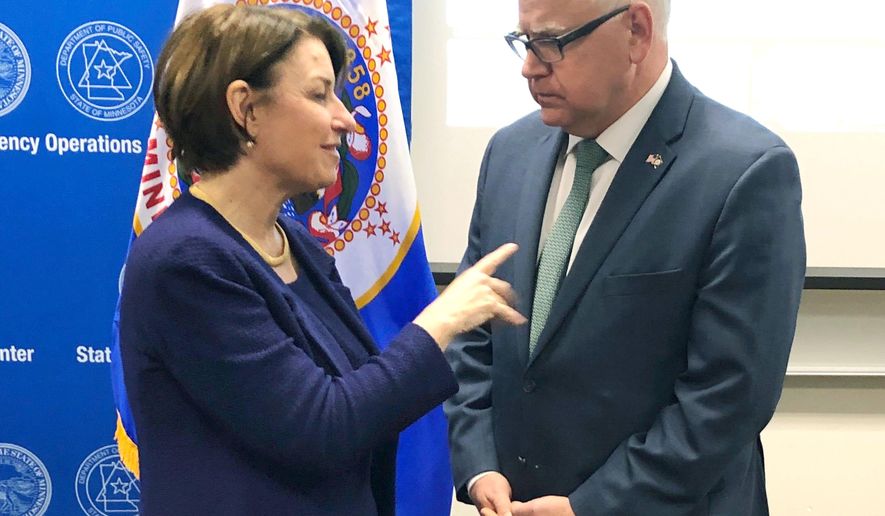The killing of George Floyd by a Minneapolis police officer last year set off calls among liberals to “defund the police,” and now that city’s voters will decide a ballot measure that would replace cops with social workers or drug counselors on some 911 calls.
The measure wouldn’t technically defund police, but it would empower city officials to cut spending on the police department and hire social workers instead of cops.
Prominent Minnesota Democrats are distancing themselves from the suggestion of cutting police departments during a national crime wave. Gov. Tim Walz and the state’s senior U.S. senator, Amy Klobuchar, have announced their opposition to the ballot initiative.
“With rising crime rates in Minneapolis, law and order is on the mind in that city and across the country,” said David Schultz, a political science professor at Hamline University in St. Paul. “Democrats are seeking to distance themselves from an issue that can and will be used against them in the 2020 elections.”
Still, dozens of groups on the left are championing the Minnesota ballot question but are taking pains to avoid the “defund the police” label. The reluctance of top Democrats has not discouraged efforts across the country to replace police.
Minneapolis joins Los Angeles; Denver; Portland, Oregon; and the District of Columbia in experimenting with “crisis intervention” programs that send unarmed counselors to respond to some 911 calls.
Minneapolis has already added two mental health professionals to work with 911 dispatchers.
If voters approve the ballot measure in November, dispatchers will start sending mental health or drug abuse counselors to emergency calls where appropriate.
Under the measure, the police department would be renamed the Department of Public Safety. It would eliminate a deal struck between the police union and the city in the 1960s requiring the city to spend at least 35% of its budget on the police department.
More leeway on spending would allow the city to dispatch mental health experts, said JaNae Bates, a spokeswoman for the ballot measure campaign.
“There’s nothing in there that says anyone has to get fired,” she said of police officers.
Reactions of top Democrats underscore the political toxicity of the policing issue.
Mr. Walz, a member of Minnesota’s Democratic-Farmer-Labor Party, referred to increasing crime last week in opposing the measure.
“I just think that the debate appears to be too simplified, and I think it’s fraught with peril to just use a slogan like ’defund the police,’” the governor said.
Rep. Angie Craig, a Minnesota Democrat who represents suburban areas south of Minneapolis, called the measure “shortsighted, misguided and likely to harm the very communities that it seeks to protect.”
A spokeswoman for Ms. Klobuchar said the Minnesota Democrat “has also repeatedly stated her opposition to defunding the police.”
The measure retains support from far-left Democrats such as Rep. Ilhan Omar, who represents Minneapolis.
In an op-ed in the city’s daily paper, The Star Tribune, Ms. Omar endorsed the ballot measure and argued that it wasn’t a “defund the police” plan.
“Let’s be clear about what the amendment is not: It has nothing to do with funding levels, much less defunding public safety in Minneapolis,” she wrote.
The skittishness of some Democrats to support the proposal explains why cities have not slashed police forces despite pressure from the political left, said Dennis Kenney, a professor at the City University of New York’s John Jay College of Criminal Justice.
“The changes have been relatively minor,” said Mr. Kenney. “A lot of it has to do with the political cost that would come when there’s a perception that crime is increasing.”
Some cities have experimented with sending mental health counselors to deal with reports of mentally ill people, but the counselors were added to police departments instead of replacing officers, he said.
Polls show broader support for those types of changes to police departments.
The Minneapolis ballot measure runs into a familiar problem for policing overhaul plans: confusion about what “defund the police’’ means, said Ben Yisrael, a policy fellow at Texas Southern University’s Center for Justice Research.
“To some, defund the police means to abolish, to others it means broad reforms with more investments in mental health, and others have no clear vision for what police reform would entail,” he said. “When people are confused or concerned, they are more likely to lean towards the status quo.”
Advocates for reinventing policing in America say the confusion has allowed opponents to link any changes to the complete elimination of police departments.
The Minneapolis measure adds to the confusion. According to the ballot question, the public safety department “could include licensed peace officers if necessary.”
“You read that and you think, ‘Wait, what do you mean by, if necessary?’” said Rashawn Ray, a fellow at the left-leaning Brookings Institution.
• Kery Murakami can be reached at kmurakami@washingtontimes.com.




Please read our comment policy before commenting.